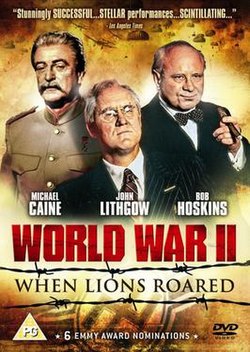| World War II: When Lions Roared | |
|---|---|
 UK DVD cover art | |
| Genre | Drama History War |
| Screenplay by | David Rintels |
| Directed by | Joseph Sargent |
| Starring | Michael Caine John Lithgow Bob Hoskins |
| Music by | John Morris |
| Country of origin | United States |
| Original language | English |
| Production | |
| Executive producer | Ethel Winant |
| Producers | Bruce M. Kerner David W. Rintels Victoria Riskin |
| Production location | Prague, Czech Republic |
| Cinematography | John A. Alonzo |
| Editor | John A. Martinelli |
| Running time | 194 minutes |
| Production companies | Gideon Productions The Kushner-Locke Company World International Network |
| Original release | |
| Network | NBC |
| Release | April 19 – April 20, 1994 |
World War II: When Lions Roared (also known as Then There Were Giants) is a 1994 American war television miniseries, directed by Joseph Sargent, and starring Michael Caine, John Lithgow and Bob Hoskins as the three major Allied leaders, Joseph Stalin, Franklin D. Roosevelt and Winston Churchill respectively. [1] It was notable as the first video production to be produced in high-definition video for broadcast in the United States, using the Sony HDVS line of analog high-definition equipment, although it was broadcast by the NBC television network in standard NTSC resolution. [2]